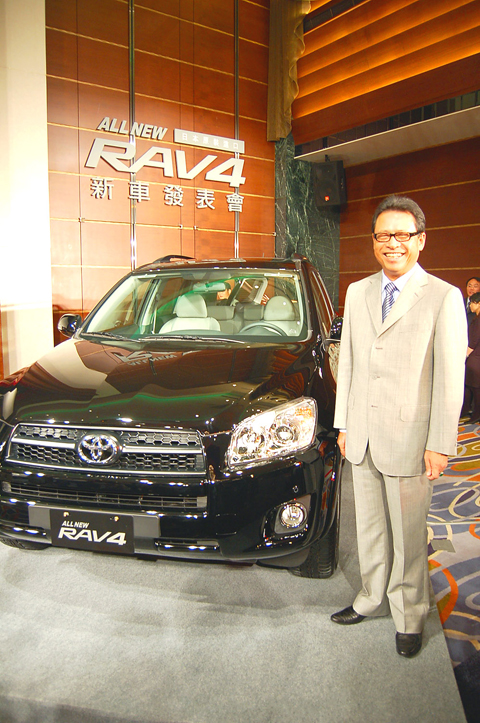Hotai Motor Co (和泰汽車), which distributes both Toyota and Lexus models in Taiwan, yesterday announced it would join the local sport utility vehicle (SUV) market in an attempt to expand its market share.
Hotai Motor introduced the new Toyota RAV4 SUV models, priced between NT$845,000 and NT$1,150,000 (US$26,800 to US$36,500) to be imported from Japan.
“The launch of RAV4 will not only help increase our product variety, but also undeniably give a shot of adrenaline to the local automobile market and Toyota’s sales this year,” Hotai Motor president Daniel Chang (張重彥), said at a press conference.

PHOTO: KAO CHIA-HE, TAIPEI TIMES
New car sales statistics provided by Hotai Motor and the Ministry of Transportation and Communications (MOTC) showed that Hotai Motor ranked No. 1 with a total of 55,229 Toyota and Lexus automobiles sold from January to Aug. 20, a market share of 34.7 percent.
Despite this, Hotai Motor’s sales figure plunged 24.7 percent from a year earlier. The decline in the lackluster Taiwan auto market was 28.2 percent year-on-year to 159,007 units as of Aug. 20.
“The Taiwan auto market has declined sharply for three consecutive years, however, the SUV market share has steadily remained above 11 percent because of the introduction of new models, which shows that local consumers’ willingness to purchase SUVs have not been affected by high oil prices,” vice president of the vehicles operations group at Hotai Motor, Justin Su (蘇純興), said yesterday.
Hotai Motor aims to sell 500 RAV4 SUVs per month in Taiwan, and reach a market share of between one-third and one-quarter in the local SUV market, Su said.
Because of the impact of the US subprime crisis and high oil prices, Chang said the local auto market will not recover until next year and new car sales in the second half of this year will be even worse than the first half.
New car sales of both domestic and imported models in Taiwan are expected to be around 230,000 units this year and 260,000 units next year, Chang said.

SEEKING CLARITY: Washington should not adopt measures that create uncertainties for ‘existing semiconductor investments,’ TSMC said referring to its US$165 billion in the US Taiwan Semiconductor Manufacturing Co (TSMC, 台積電) told the US that any future tariffs on Taiwanese semiconductors could reduce demand for chips and derail its pledge to increase its investment in Arizona. “New import restrictions could jeopardize current US leadership in the competitive technology industry and create uncertainties for many committed semiconductor capital projects in the US, including TSMC Arizona’s significant investment plan in Phoenix,” the chipmaker wrote in a letter to the US Department of Commerce. TSMC issued the warning in response to a solicitation for comments by the department on a possible tariff on semiconductor imports by US President Donald Trump’s

‘FAILED EXPORT CONTROLS’: Jensen Huang said that Washington should maximize the speed of AI diffusion, because not doing so would give competitors an advantage Nvidia Corp cofounder and chief executive officer Jensen Huang (黃仁勳) yesterday criticized the US government’s restrictions on exports of artificial intelligence (AI) chips to China, saying that the policy was a failure and would only spur China to accelerate AI development. The export controls gave China the spirit, motivation and government support to accelerate AI development, Huang told reporters at the Computex trade show in Taipei. The competition in China is already intense, given its strong software capabilities, extensive technology ecosystems and work efficiency, he said. “All in all, the export controls were a failure. The facts would suggest it,” he said. “The US

The government has launched a three-pronged strategy to attract local and international talent, aiming to position Taiwan as a new global hub following Nvidia Corp’s announcement that it has chosen Taipei as the site of its Taiwan headquarters. Nvidia cofounder and CEO Jensen Huang (黃仁勳) on Monday last week announced during his keynote speech at the Computex trade show in Taipei that the Nvidia Constellation, the company’s planned Taiwan headquarters, would be located in the Beitou-Shilin Technology Park (北投士林科技園區) in Taipei. Huang’s decision to establish a base in Taiwan is “primarily due to Taiwan’s talent pool and its strength in the semiconductor

French President Emmanuel Macron has expressed gratitude to Hon Hai Precision Industry Co (鴻海精密) for its plan to invest approximately 250 million euros (US$278 million) in a joint venture in France focused on the semiconductor and space industries. On his official X account on Tuesday, Macron thanked Hon Hai, also known globally as Foxconn Technology Group (富士康科技集團), for its investment projects announced at Choose France, a flagship economic summit held on Monday to attract foreign investment. In the post, Macron included a GIF displaying the national flag of the Republic of China (Taiwan), as he did for other foreign investors, including China-based